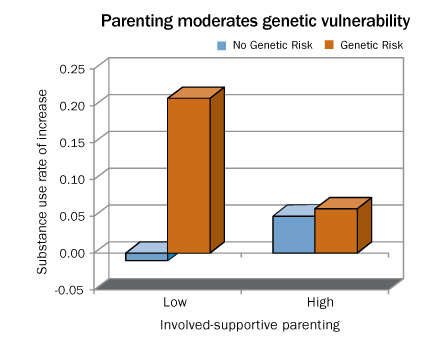Parenting shapes genetic risk for drug use
Drugs have a heightened appeal for teens who inherit a certain gene variant, unless the youngsters also have involved, supportive parents
Good parenting provides a potent buffer against some youngsters’ genetic predisposition to use alcohol, cigarettes and marijuana by age 14, a new study finds. Uninvolved, unsupportive parenting heralds a spike in consumption of these substances among genetically vulnerable teens, reports a team led by psychologist Gene Brody of the University of Georgia in Athens.
Brody and his colleagues conducted what to their knowledge is the first long-term examination of how parenting practices combine with a child’s genetic makeup to either prompt or prevent early drug use. Their results, based on a three-year study of rural, black youths from working poor families, a population that Brody’s Center for Family Research works with regularly, appear in the February Journal of Consulting and Clinical Psychology.
“Our study emphasizes that there are protective processes in children’s lives, such as effective parenting, that shield them from a genetic risk for early substance use,” Brody says.
His team focused on variations in the serotonin transporter gene, or 5HTT. This gene assists in regulating transmission of serotonin, a chemical messenger in the brain. Many people carry two copies of a long version of 5HTT. But approximately 40 percent of people inherit either one or two copies of a short version of the gene. Having at least one short version lessens serotonin transmission, relative to two long versions.
A growing number of studies suggest that a short version of the 5HTT gene aggravates people’s responses to psychological stress of various kinds, remarks Avshalom Caspi, a psychologist at Duke University in Durham, N.C. Caspi and his Duke colleague Terrie Moffitt directed a 2003 investigation that first implicated a combination of the short 5HTT gene and childhood abuse in the development of adult depression.
More than 30 studies since then have looked at how the serotonin-transporter gene’s short version and stressful events contribute to later depression. The results have been mixed.
“Stress reactions in people with this genetic variation can take multiple forms and may include not only depression but, among adolescents, drug use,” Caspi says. The new results support this scenario, he adds.
In the new study, black experimenters interviewed 253 youngsters in their homes about past drug use and interviewed their mothers about parenting practices. Youngsters were randomly selected from lists of 11-year-old public school students in four counties.
Follow-up interviews occurred annually until youths reached age 14. DNA was then obtained from samples of each youngster’s saliva.
About 43 percent of the students carried either one or two copies of the serotonin-transporter gene’s short version.
Approximately 5 percent of the 11-year-olds, regardless of genetic makeup, reported that they had smoked cigarettes in the past year. Another 12 percent had occasionally drunk alcohol, less than 1 percent had consumed three or more alcoholic drinks at one time and virtually none had smoked marijuana.
By age 14, 21 percent of teens reported having smoked cigarettes in the past year, 42 percent had occasionally drunk alcohol, 5 percent had consumed three or more alcoholic drinks at one time and 5 percent had smoked marijuana.
Among youngsters who carried at least one copy of the short serotonin transporter gene and lived with parents identified as highly uninvolved, the rate of overall drug use increased 21 percent from age 11 to 14. That figure reached only a 7 percent increase among genetically vulnerable youths who lived with highly involved, emotionally supportive parents.
Influences other than parenting quality apparently affected the habits of youths with a low genetic risk for drug taking, Brody says. In that group, substance use increased by a modest 5 percent for teens living with highly involved, supportive parents but stayed relatively stable for those living with uninvolved parents. Kids with and without the genetic risk may be sensitive to different environmental influences on drug use, Brody suggests.








